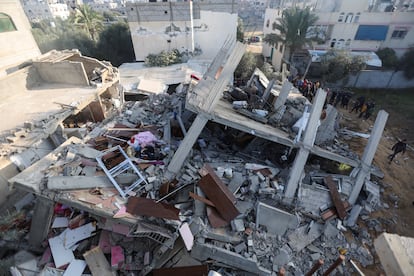European diplomacy steps up calls for Gaza ceasefire
The British and German foreign ministers said in a joint article Sunday that ‘too many civilians have been killed.’ Their French counterpart also pushed for a ceasefire on Saturday

Some of Israel’s closest European allies pressed for a ceasefire in the war with Hamas on Sunday, underscoring growing international unease with the devastating impact of the conflict on Gaza’s civilian population.
The concerted push by top European diplomats comes ahead of a visit to Israel on Monday by U.S. Defense Secretary Lloyd Austin, who is also expected to put pressure on Israeli leaders to end the war’s most intense phase and transit to a more targeted strategy against Hamas.
Western allies of Israel have increasingly expressed concern with civilian casualties and the mass displacement of 1.9 million Palestinians — nearly 85% of Gaza’s population — though the U.S. has continued to provide vital military and diplomatic support to its close ally.
In a joint article in the Sunday Times, a British weekly, U.K. Foreign Secretary David Cameron and German Foreign Affairs Minister Annalena Baerbock called for a ceasefire and said “too many civilians have been killed. The Israeli government should do more to discriminate sufficiently between terrorists and civilians, ensuring its campaign targets Hamas leaders and operatives.”
“Israel will not win this war if its operations destroy the prospect of peaceful co-existence with Palestinians,” they said. They said the cease-fire should take place as soon as possible, but also said it must be “sustainable.”
At a news conference with her Israeli counterpart in Tel Aviv on Sunday, French Foreign Minister Catherine Colonna also pushed for a ceasefire.
“An immediate truce is necessary, allowing progress to be made toward a cease-fire to obtain the release of the hostages, to allow access and the delivery of more humanitarian aid to the suffering civilian population of Gaza, and in fact to move toward a humanitarian cease-fire and the beginning of a political solution,” she said.
Britain has previously called for “humanitarian pauses” in the conflict but stopped short of urging an immediate ceasefire. It abstained last week when the U.N. General Assembly overwhelmingly voted for a ceasefire.
France and Germany both supported the call for a ceasefire at the U.N., and French President Emmanuel Macron said at the beginning of November that Israel couldn’t fight terrorism by killing innocent people.
The increase in diplomatic pressure comes as domestic calls are also likely to grow for renewed negotiations with Hamas, following the accidental killing of three Israeli hostages by the military on Friday.
The air and ground war has flattened vast swaths of northern Gaza and driven most of the population to the southern part of the besieged territory, where many are packed into crowded shelters and tent camps. The offensive has killed more than 18,700 Palestinians, according to the Health Ministry in the Hamas-run territory. The ministry does not differentiate between civilians and combatants.
Israel has continued to strike what it says are militant targets in all parts of Gaza. It has vowed to continue operations until it dismantles Hamas, which triggered the war with its October 7 attack into southern Israel, in which militants killed 1,200 people, mostly civilians. Israel has also vowed to return the estimated 129 hostages still held in Gaza.
Sign up for our weekly newsletter to get more English-language news coverage from EL PAÍS USA Edition
Tu suscripción se está usando en otro dispositivo
¿Quieres añadir otro usuario a tu suscripción?
Si continúas leyendo en este dispositivo, no se podrá leer en el otro.
FlechaTu suscripción se está usando en otro dispositivo y solo puedes acceder a EL PAÍS desde un dispositivo a la vez.
Si quieres compartir tu cuenta, cambia tu suscripción a la modalidad Premium, así podrás añadir otro usuario. Cada uno accederá con su propia cuenta de email, lo que os permitirá personalizar vuestra experiencia en EL PAÍS.
¿Tienes una suscripción de empresa? Accede aquí para contratar más cuentas.
En el caso de no saber quién está usando tu cuenta, te recomendamos cambiar tu contraseña aquí.
Si decides continuar compartiendo tu cuenta, este mensaje se mostrará en tu dispositivo y en el de la otra persona que está usando tu cuenta de forma indefinida, afectando a tu experiencia de lectura. Puedes consultar aquí los términos y condiciones de la suscripción digital.








































